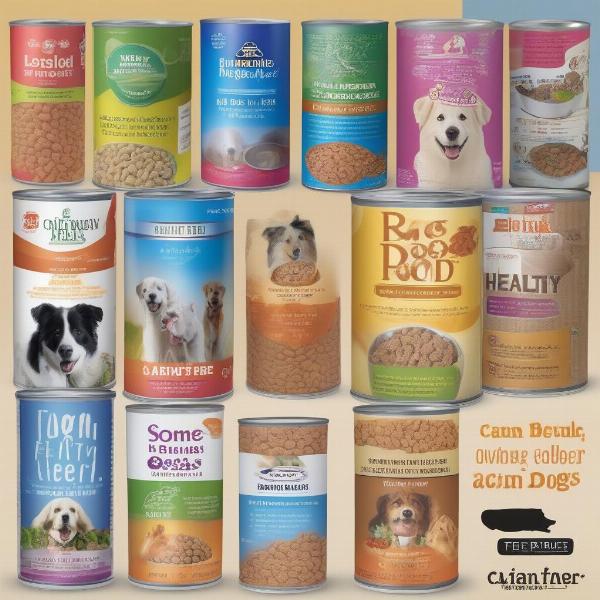Constipation in dogs can be uncomfortable and even painful. While there are several remedies, choosing the right canned dog food can play a crucial role in preventing and alleviating this issue. This article will delve into what causes constipation in dogs, what to look for in a good canned food for constipation, and review some of the best options available.
Understanding Canine Constipation
Several factors can contribute to constipation in your furry friend. These include a lack of fiber in their diet, dehydration, insufficient exercise, ingestion of foreign objects, certain medications, and underlying medical conditions. Recognizing the signs of constipation is crucial for prompt intervention. These signs can include straining during bowel movements, producing hard, dry stools, infrequent defecation, and displaying signs of discomfort like abdominal pain or loss of appetite. If your dog exhibits these symptoms, it’s essential to consult your veterinarian to rule out any serious underlying health issues.
 Canned dog food for constipation
Canned dog food for constipation
Key Ingredients to Look for in Canned Dog Food for Constipation
When choosing canned dog food for constipation, look for options that are rich in fiber. Fiber adds bulk to the stool, making it easier to pass. Look for ingredients like beet pulp, pumpkin, sweet potato, and brown rice. Moisture is also key. Canned food has a significantly higher moisture content compared to dry kibble, which helps soften the stool and promote regular bowel movements.
Top Canned Dog Food Choices for Constipation
Several brands offer canned dog food formulated to support healthy digestion. It’s important to consider your dog’s individual needs, breed, and any allergies when making a selection. Always check the ingredient list and consult with your vet if you have any concerns. Some highly-rated options include brands known for their focus on digestive health, using ingredients like pumpkin and prebiotics.
How to Transition Your Dog to a New Canned Food
Switching your dog’s food should be a gradual process to avoid digestive upset. Start by mixing a small amount of the new canned food with their current food. Gradually increase the proportion of the new food over several days until they are fully transitioned.
Beyond Diet: Other Ways to Help a Constipated Dog
While diet plays a crucial role in managing constipation, other factors are also important. Ensure your dog has access to plenty of fresh water to stay hydrated. Regular exercise stimulates bowel movements, so aim for daily walks or playtime.
Is Homemade Canned Dog Food an Option for Constipation?
If you’re considering making your own canned dog food, consult with a veterinary nutritionist. They can help you create a balanced recipe that meets your dog’s specific nutritional needs and addresses constipation concerns.
Conclusion
Choosing the best canned dog food for constipation involves considering factors like fiber content, moisture, and your dog’s overall health needs. By making informed choices and incorporating other healthy habits like regular exercise and hydration, you can help your dog maintain regular, comfortable bowel movements and avoid the discomfort of constipation.
FAQ
- How can I tell if my dog is constipated? Signs include straining during bowel movements, hard, dry stools, infrequent defecation, and abdominal discomfort.
- What is the best canned dog food for constipation? Several brands offer high-fiber, moisture-rich options, but it’s crucial to consult with your vet for recommendations tailored to your dog’s needs.
- Can I give my dog human laxatives for constipation? Never give your dog human medication without consulting your vet. Human laxatives can be harmful to dogs.
- How much water should a dog drink to avoid constipation? Dogs should have access to fresh water at all times.
- How often should a dog poop? Most dogs poop once or twice a day, but this can vary depending on their diet, age, and activity level.
- Can exercise help with dog constipation? Yes, regular exercise stimulates bowel movements and can help prevent constipation.
- What should I do if my dog hasn’t pooped in several days? Contact your veterinarian immediately.
Related Articles on ILM Dog
ILM Dog is your trusted resource for expert advice on dog care, covering everything from breed selection and health to training, nutrition, and grooming. We offer practical, reliable information to help you provide the best possible care for your canine companion. Whether you’re a seasoned dog owner or just starting out, ILM Dog is here to support you every step of the way. Contact us at [email protected] or +44 20-3965-8624 for personalized guidance.